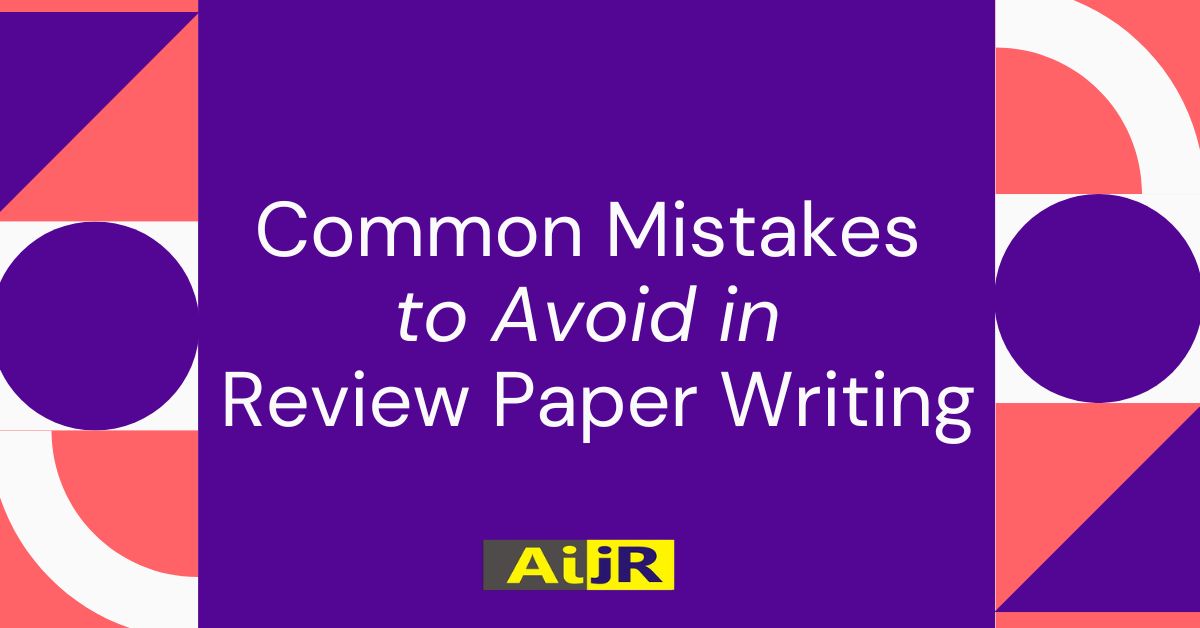Writing a review paper requires precise language to ensure clarity and avoid misleading the reader. Many authors unintentionally use terms that suggest their paper includes original research when, in reality, it only synthesizes existing studies. Phrases like “this study,” “this research,” “this work,” and “the author’s work” can create confusion if not used appropriately. This article will discuss how to correctly use these terms in review papers and offer practical guidance to maintain accuracy and consistency in academic writing.
Common Misleading Terms and How to Avoid Them
1️⃣ “This Study” / “This Research”
These terms are most commonly misused in review papers. They typically indicate that the paper includes original experiments, data collection, or new findings. However, a review article does not present new research—it summarizes, compares, and analyzes existing studies.
🚫 Incorrect Usage in a Review Paper:
“This study examines the effects of indoor air pollution on human health.”
✅ Corrected Version:
“This review explores the effects of indoor air pollution on human health by synthesizing findings from previous studies.”
✅ When “This Study” Can Be Used:
- When discussing a specific research paper that has been cited:
“Smith et al. (2020) conducted an experiment on air pollution. This study found a strong correlation between poor ventilation and respiratory diseases.” - When referring to a systematic review or meta-analysis within the paper:
“This study compiles data from multiple sources to identify key trends in pollutant exposure.”
2️⃣ “This Work” / “The Present Work”
Authors often use “this work” or “the present work” to refer to their paper, but in a review, this can wrongly imply that the paper contains original findings. These phrases are more appropriate in experimental research papers where new results are presented.
🚫 Misleading Usage in a Review Paper:
“The present work introduces a novel approach to studying indoor air pollution.”
✅ Corrected Version:
“This review provides an overview of approaches used to study indoor air pollution.”
🚫 Another Example of Incorrect Usage:
“This work proposes a mathematical model for assessing air quality.”
✅ Better Alternative:
“This review discusses existing mathematical models used to assess air quality.”
3️⃣ “The Author’s Work” / “Our Work”
Some authors use phrases like “the author’s work” or “our work” in review papers, creating the impression that they are presenting their own experiments. Unless the paper includes original contributions, these phrases should be avoided.
🚫 Misleading Usage:
“Our work investigates the role of ventilation in improving indoor air quality.”
✅ Corrected Version:
“This review examines the role of ventilation in improving indoor air quality based on existing studies.”
🚫 Another Incorrect Example:
“The author’s work introduces a new framework for evaluating pollutant interactions.”
✅ Better Alternative:
“This paper reviews various frameworks for evaluating pollutant interactions.”
4️⃣ “We Found” / “Our Results Show”
Phrases like “we found,” “our results indicate,” or “our study demonstrates” should be avoided in review papers because they suggest the paper includes original experimental results. A review does not generate new findings—it compiles and analyzes existing data.
🚫 Incorrect Usage in a Review Paper:
“We found that ventilation plays a crucial role in reducing indoor pollutants.”
✅ Corrected Version:
“Studies have shown that ventilation plays a crucial role in reducing indoor pollutants.”
🚫 Another Incorrect Example:
“Our results suggest that air purification systems improve indoor air quality.”
✅ Better Alternative:
“Research indicates that air purification systems improve indoor air quality.”
Using precise terminology in a review paper helps maintain clarity and prevents misinterpretation. Avoiding phrases like “this study” and “this research” ensures that readers understand the paper as a review rather than original research. Instead, using terms like “this review,” “this paper,” or “this article” keeps the writing accurate and professional.
Best Practices for Writing a Review Paper
1️⃣ Use “This Review” or “This Paper” to refer to the document:
- ✅ “This review discusses the impact of pollution on indoor air quality.”
- ✅ “This paper summarizes recent advancements in air purification technologies.”
2️⃣ Avoid Implying Original Research unless your paper includes a meta-analysis or theoretical contribution:
- ❌ “Our study analyzes data on air pollution.”
- ✅ “This review compiles data on air pollution from multiple sources.”
3️⃣ Use Neutral Language When Describing Findings from other studies:
- ✅ “Research suggests that poor ventilation increases pollutant exposure.”
- ✅ “Several studies have demonstrated the link between indoor pollution and respiratory diseases.”
4️⃣ Be Consistent Throughout the Paper by choosing a single term (e.g., “this review”) and sticking to it.
Ensure consistency by using “this review” or “this paper” throughout. Avoid “this study” or “this research,” unless referring to specific studies cited in the review.
Choosing the right terms in a review paper is essential for maintaining clarity and professionalism. Authors should avoid phrases that imply original research, such as “this study,” “this research,” “this work,” and “our results.” Instead, they should use “this review,” “this paper,” or “this article” to accurately describe their work. By carefully selecting language, authors can ensure that their review is both accurate and credible, avoiding any unintentional misrepresentation.
Once an appropriate term is chosen, it is important to use it consistently throughout the paper. Switching between “this review,” “this paper,” and “this study” randomly can create confusion. A simple way to ensure consistency is to decide on a primary term (“this review”) and use it whenever referring to the overall content.
Additionally, using the correct tense in a review paper writing helps distinguish between previous research and the author’s analysis. Past tense is used for representing the past studies, while present tense is preferred for general facts and established theories. When presenting the author’s interpretation, comparisons, or conclusions, present or present perfect tense is appropriate. Proper in-text citation of relevant and recent references ensures credibility and keeps the discussion focused on current advancements. Consistent tense usage enhances clarity and prevents confusion between existing research and the review’s insights.


